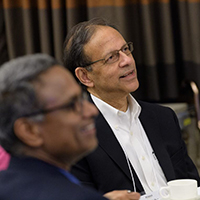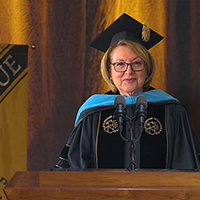Prepared for Liftoff
A conversation with Paul Neary (MSIA’87), Chief Financial Officer, Boeing Space and Launch
 Why did you choose to attend Purdue and the Krannert School?
Why did you choose to attend Purdue and the Krannert School?
From an early age, my family instilled the value of education, working to achieve personal goals, and giving back to the community.
At the time I was deciding where to attend business school, I had completed my bachelor’s degree in biology and was within six credit hours of completing my master’s degree in microbiology. I had grown accustomed to the scientific and analytical methods of solving problems and advancing my education.
In retrospect, the factors you consider when choosing a business school are similar to those you might consider for your first career position after graduation. What industry is of interest to you? Which company within your selected industry aligns with who you are and how you plan to conduct business? Does the company offer the opportunity to demonstrate your business acumen and continue to grow and learn?
Purdue, and specifically Krannert, met or exceeded my expectations for an advanced business school education on many fronts. These include an analytical emphasis with deep roots in engineering; an emerging life science focus; industry-experienced faculty; broad curriculum that allowed the novice business student to develop a solid foundation and adequate elective hours; significant infrastructure investment to provide access to the latest tools and applications; and a diverse, inclusive student body with a wide range of educational, professional and cultural backgrounds.
What are your favorite memories of your time as a student?
Before joining Krannert, I had spent the better part of five years in science labs, focused on my class work and research. Within the first few weeks of joining the Krannert MSIA program, I was inspired by my fellow students’ willingness to accept and invest in me, someone with little formal business education. This was enabled, in part, by Krannert’s use of case studies and team projects that fostered collaboration and extracted the best from each team member.
I also appreciated the executive forums, which helped reveal the path from education to practice. Not only did they offer insight into the skills and experience that industry leaders valued most, but the forums also enabled students to begin building a network of mentors and career advocates.
How did Purdue and Krannert prepare you for your career?
There are many insights and perspectives I have carried with me since graduating Krannert and that I now share with my team and mentees. First, when working through a difficult situation, use data to frame the problem statement. Then apply LEAN/Six Sigma methods to eliminate waste and identify opportunities for improvement while soliciting each team member’s proposed solution with a focus on innovation.
Krannert also helped me identify the three key elements to advancing the ball: analytics, integration and urgency.
Finally, from a team dynamics perspective, Krannert instilled several key insights:
- Competition helps industry focus on continuous improvement and efficiencies;
- Solicit and appreciate the contribution of others and ensure all team members have a voice and feel valued;
- Business is ever evolving and we each have the opportunity to learn, grown and shape the future.
What led you to pursue a career in the aerospace industry?
The aerospace industry has been an integral part of my entire life. I am the youngest of five kids whose father worked for 43 years as a systems engineer at Boeing. I remember the family viewing Blue Angels air shows, watching Gemini and Apollo mission news clips, and attending rollout events for new military aircraft, such as the F-15. From an early age, I was captivated.
In addition to being raised in an aerospace household, I am in awe of the breadth, reach and impact of the aerospace industry. Aerospace is a game-changer. The industry allows family members to stay connected around the globe either by transport or communication. It is continuously challenged to discover and apply new technologies to solve the world’s evolving problems and threats. And it allows Americans to enjoy the freedoms our ancestors defined.
Further, the aerospace industry provides a wide range of opportunities for individuals from diverse backgrounds to contribute to the lives of others and unlock the secrets of our planet and the universe — in the water, on land, and in air and space.
What is your current role as CFO of Space and Launch?
Boeing’s Space and Launch division is a ~$4.5 billion portfolio of programs covering space exploration, launch capabilities, and government and commercial satellites. As the CFO, I serve as a strategic business partner to the senior vice president of Space and Launch and other senior leadership team members. In this capacity, I aid the development and implementation of long-term goals and strategies for growth, and the execution of existing backlog. To take strategy to action, the Finance team evaluates alternative cost structures, sourcing opportunities, and affordability initiatives. These efforts are reflected in the strategic and long-term business plans for the division.
As the Space and Launch CFO, I am honored to be a member of the board of directors for United Launch Alliance (ULA), which is a 50/50 joint venture between Boeing and Lockheed Martin to build rockets and launch satellites for the U.S. Air Force, National Reconnaissance Office, NASA and commercial operators. In this capacity, I also serve as the chair of the Audit Committee.
As CFO, I also play a leadership role in Compliance, and Opportunity and Risk Management. The Space and Launch division is required to comply with Federal Acquisition Regulations that govern the acquisition of new work and the execution of awarded work, as well as SEC reporting requirements. To keep everyone informed and aligned, Finance leads the efforts to communicate expectations and forecasts, conduct robust monitoring, and ensure compliance with our fiscal obligations. In terms of Opportunity and Risk Management, Finance is the conduit through which new business opportunities are discussed and managed. Finance provides continuity between the team that wins new business to the team that executes new business, and is crucial to optimizing financial performance.
Meeting internal and external customer financial analysis and reporting expectations is another responsibility of the CFO. Finance, in collaboration with Program Management, develops resourced schedules aligned with contractual obligations. Once the contractual scope is base-lined, Finance performs analysis, estimates the schedule and cost to complete, and reports the results to our customers. These activities require significant cross-functional integration with Engineering, Operations, Quality, and Supply Chain. These analyses, inclusive of Opportunity and Risk Management, provide the foundation to support Boeing’s quarterly reporting obligations and Investor Relations outreach.
Lastly, I have the privilege to recruit, develop and advance Space and Launch Finance teammates. Similar to my experience at Krannert, I strive to create a collaborative, “speak up” culture, where every teammate’s voice is heard. I also provide development opportunities for the team to obtain and apply skills, and value each team members’ contribution.
How important is data analytics to your job and the industry?
Data analytics, and more specifically predictive data analytics, is extremely important. Across industries, finance has moved up the value chain to become a trusted business partner. Moreover, finance has done so using analytics to shape strategic decisions. However, the analytics today are far different from 20 or 30 years ago. Today, analytics, or evidence-based data, is expected to enable leadership a “look around the corner” and anticipate the challenges and opportunities to profitably grow the business.
By adopting a logical approach to define the issues, structure the analytical methodology, and select data sources and tools to drive impactful recommendations, we increased our value to the enterprise and created our seat at the table.
However, to remain relevant and enhance our value to the enterprise, we must continue to expand the use of business process automation and develop digital workforce skills focused on change agility, social intelligence, evidence-based analysis, and business insights.









